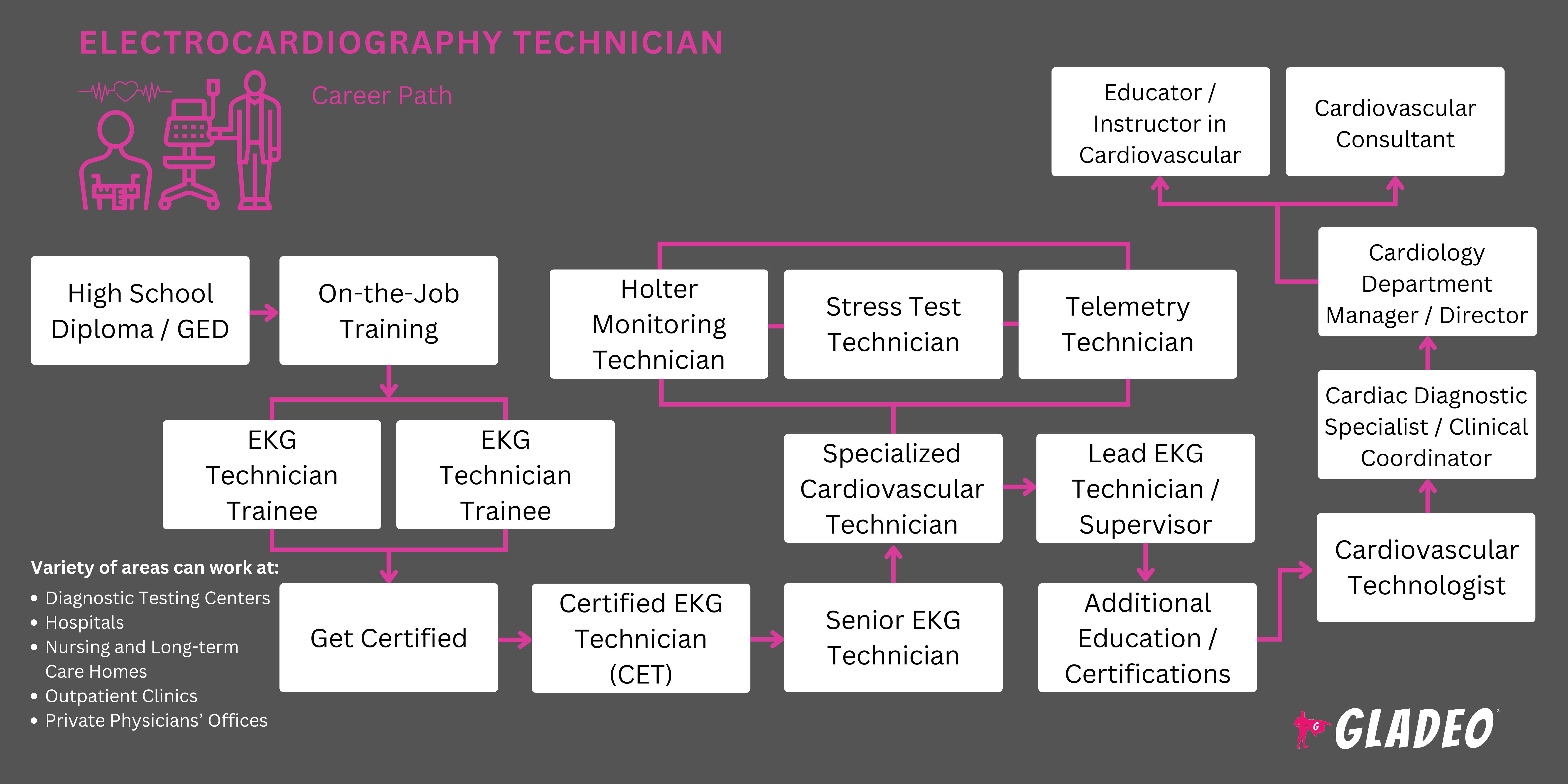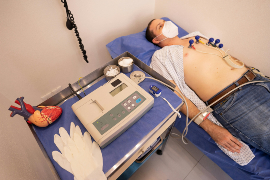Mga spotlight
Cardiac Monitor Technician, EKG Technician, ECG Technologist, Cardiovascular Technician, Telemetry Technician
Every heartbeat tells a story—and Electrocardiography Technicians are the ones who help doctors read it. These healthcare professionals operate special equipment that records the electrical activity of a patient’s heart, helping physicians detect irregular rhythms, heart attacks, or other cardiac conditions.
Working under the supervision of doctors or nurses, EKG Technicians attach electrodes to a patient’s chest, arms, and legs, then run tests that capture data on heart activity. They ensure that each recording is clear and accurate, explain procedures to patients, and sometimes assist during cardiac stress tests or continuous heart monitoring.
It’s a career for someone who enjoys technology, pays close attention to detail, and finds satisfaction in helping doctors make life-saving diagnoses.
- Playing a direct role in detecting heart conditions early—sometimes before symptoms appear.
- Working closely with doctors, nurses, and patients in a fast-paced, meaningful healthcare setting.
- Using advanced diagnostic equipment that blends medicine with technology.
- Gaining skills that can lead to other careers in the medical field, such as cardiovascular sonography or nursing.
Oras ng trabaho
EKG Technicians typically work full-time in hospitals, diagnostic labs, and clinics. Shifts may include early mornings, evenings, weekends, or holidays—especially in emergency or hospital settings.
Mga Karaniwang Tungkulin
- Prepare patients for EKG tests by explaining procedures and attaching electrodes correctly.
- Operate EKG machines to record heart activity.
- Monitor patients during testing for any distress or irregularities.
- Review EKG tracings for clarity and accuracy before passing them to physicians.
- Maintain and clean equipment regularly.
- Enter patient data into medical records systems.
- Assist during stress tests or Holter monitoring setups.
Mga Karagdagang Pananagutan
- Educate patients on proper electrode placement for at-home monitoring.
- Calibrate and troubleshoot EKG machines and sensors.
- Communicate effectively with nurses and physicians about abnormal results.
- Ensure confidentiality and follow HIPAA regulations.
- Support other diagnostic procedures as needed, such as blood pressure or oxygen readings.
- Stay current with new cardiac technologies and testing standards.
A typical day for an Electrocardiography Technician starts early, preparing EKG machines and checking that all electrodes, wires, and paper supplies are ready for use. The first patients might arrive for routine heart tests or pre-surgery screenings. The technician greets each one, explains the procedure, and carefully places electrodes on their chest, arms, and legs.
Throughout the day, they record EKGs, monitor patients’ heart activity, and make sure every reading is clear and accurate before passing it to the physician. They may assist with treadmill stress tests or set up portable monitors for patients who need continuous tracking.
Teamwork is vital—EKG Technicians coordinate closely with nurses, doctors, and other diagnostic staff to ensure timely and accurate results. Before ending their shift, they clean equipment, organize patient charts, and prepare testing rooms for the next day’s appointments.
Soft Skills
- Communication and empathy
- Pansin sa detalye
- Pamamahala ng oras
- Pagtutulungan at pagtutulungan
- Pagtugon sa suliranin
- Professionalism and discretion
- Adaptability under pressure
- Patience and compassion
Teknikal na kasanayan
- EKG machine operation and maintenance
- Knowledge of cardiac anatomy and physiology
- Reading and understanding EKG waveforms
- Patient preparation and electrode placement
- Infection control and safety procedures
- Electronic medical record (EMR) documentation
- Basic computer and data entry skills
- CPR and first aid certification
- Resting EKG Technicians: Perform routine tests while patients are at rest.
- Stress Test Technicians: Monitor patients during treadmill or exercise tests.
- Holter Monitoring Technicians: Set up portable EKGs for continuous recording.
- Telemetry Technicians: Monitor heart rhythms of multiple patients remotely in hospitals.
- Hospitals and emergency departments
- Cardiology clinics
- Diagnostic laboratories
- Mga sentro ng pangangalaga sa labas ng pasyente
- Private physician offices
- Long-term care or rehabilitation facilities
The job can be physically and emotionally demanding. You may work long shifts, help anxious or critically ill patients, and remain on your feet for much of the day. Accuracy and composure under stress are crucial—small errors can lead to major consequences.
However, the reward is knowing your work contributes to diagnosing and treating heart disease—one of the world’s leading health concerns.
Advances in wearable heart technology, such as smartwatches and portable EKG devices, are transforming cardiac care. Telemetry and remote monitoring have become increasingly common, allowing technicians to track patients’ heart activity from afar. Artificial intelligence is also being used to help detect early warning signs of cardiac irregularities from EKG data.
Many enjoyed biology and health science classes, liked working with technology, or found satisfaction in helping others. Some were fascinated by how the heart works or enjoyed volunteering at hospitals and clinics.
- Electrocardiography (EKG or ECG) Technicians typically need a high school diploma or GED to begin training.
- Most complete a postsecondary certificate or diploma program in electrocardiography, cardiovascular technology, or a related medical assisting field.
- Some hospitals and vocational schools offer EKG technician training programs that can be completed in as little as 4 to 6 months.
- Employers may prefer candidates with on-the-job clinical experience or internships in hospital or diagnostic settings.
- Community colleges and technical institutes often provide training that includes both classroom instruction and hands-on practice.
- Kasama sa mga karaniwang kurso ang:
- Anatomy at pisyolohiya ng tao
- Medikal na terminolohiya
- Electrocardiography procedures
- Patient care and safety
- Cardiac rhythm interpretation
- Kontrol ng impeksyon
- Medical ethics and confidentiality (HIPAA)
- Emergency response and CPR
- Certifications that can improve job prospects include:
- Certified EKG Technician (CET) – Offered by the National Healthcareer Association (NHA)
- ECG Technician Certification (ECGTC) – Offered by American Education Certification Association
- Certified Cardiographic Technician (CCT) – Offered by Cardiovascular Credentialing International (CCI)
- Basic Life Support (BLS) – Required by most healthcare employers
Some hospitals provide formal on-the-job training programs where new technicians learn directly from experienced staff while working under supervision.
To maintain certification, technicians are often required to complete continuing education in cardiac care and patient safety.
- Take science, math, and health courses such as biology, anatomy, and algebra.
- Volunteer at hospitals, clinics, or community health fairs to gain real-world exposure to patient care.
- Join HOSA (Health Occupations Students of America) or similar health science clubs to build leadership and teamwork skills.
- Attend CPR or first aid training to develop emergency response skills early.
- Explore internships or job shadowing opportunities in hospitals or diagnostic labs to see EKG technicians at work.
- Participate in school health or science fairs and present projects related to heart health or medical technology.
- Take computer and data entry classes to prepare for handling digital patient records and monitoring equipment.
- Practice communication and interpersonal skills, since working with patients requires empathy and professionalism.
- If available, enroll in dual-enrollment or vocational healthcare programs during high school to earn early credits toward certification.
- Follow healthcare news, videos, or documentaries to stay informed about cardiovascular medicine and diagnostic technology.
- Accreditation by CAAHEP (Commission on Accreditation of Allied Health Education Programs).
- Access to clinical training or externships at local hospitals.
- Modern lab equipment and small class sizes for hands-on learning.
- High job placement or certification exam pass rates.
Sample Programs:
- Pima Medical Institute – EKG Technician Certificate
- Penn Foster College – Online EKG Technician Training
- Rasmussen University – Cardiovascular Technician Associate Program

- Search job boards like Indeed, Glassdoor, ZipRecruiter, and HospitalCareers.com using terms like EKG Technician, Cardiac Monitor Tech, or Telemetry Technician.
- Apply for entry-level positions in hospitals, outpatient centers, or diagnostic labs.
- Highlight hands-on training, certifications, and any healthcare volunteer experience on your résumé.
- Obtain BLS certification—it’s often required before hire.
- Network with instructors, clinical mentors, and classmates—they may know open positions.
- Prepare for interviews by reviewing EKG basics, patient safety, and confidentiality protocols.
- Dress professionally and express enthusiasm for patient care and teamwork.
- Be open to night or weekend shifts—these roles often open doors to full-time work later.
- Gain advanced certifications, such as the Certified Cardiographic Technician (CCT) or Registered Cardiovascular Invasive Specialist (RCIS).
- Specialize in areas like echocardiography or cardiac sonography for higher pay.
- Take continuing education courses in cardiac care technology or patient management.
- Seek supervisory or training roles as you gain experience.
- Pursue further education to transition into nursing, cardiovascular technology, or healthcare administration.
Mga website
- American Society of EKG Technicians (aset.org)
- National Healthcareer Association (nhanow.com)
- Cardiovascular Credentialing International (cci-online.org)
- American Heart Association (heart.org)
- MedlinePlus: Electrocardiogram Overview (medlineplus.gov)
- Healthcareers.org
- AlliedHealthSchools.com
- HospitalCareers.com
Mga libro
- EKG Plain and Simple by Karen Ellis
- Rapid Interpretation of EKG’s by Dale Dubin
- Electrocardiography for Healthcare Professionals by Kathryn Booth & Thomas O’Brien
Being an Electrocardiography Technician is a rewarding career, but it can be physically demanding and offers limited advancement without further education. If you’re curious about other healthcare paths that build on similar skills, check out these related options:
- Phlebotomist
- Medical Laboratory Technician
- Katulong na Medikal
- Cardiovascular Sonographer
- Technician sa Pag-aalaga ng Pasyente
- Radiologic Technologist
- Licensed Practical Nurse (LPN)
Newsfeed

Mga Tampok na Trabaho

Mga Online na Kurso at Tool








